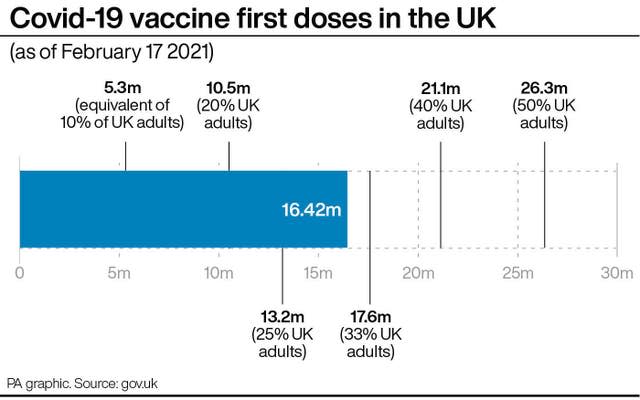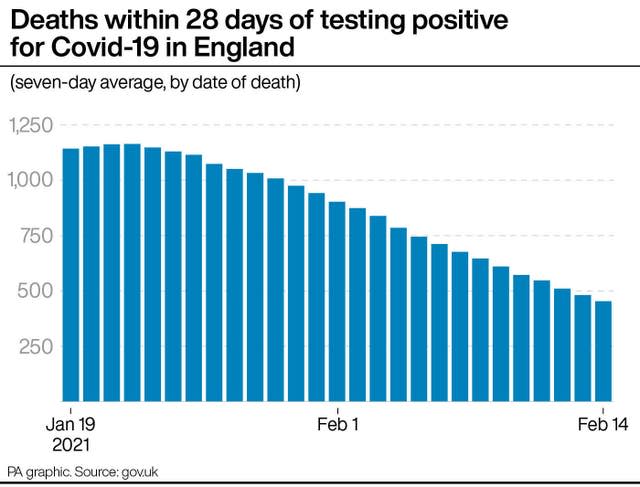Vaccines are ‘doing the job’ to cut Covid-19 cases, experts say
Vaccines are “doing the job” when it comes to cutting the number of people infected with Covid-19, a top scientific adviser has said.
Professor Adam Finn, from the University of Bristol and a member of the Joint Committee on Vaccination and Immunisation (JCVI), said “everything’s moving in the right direction” when it comes to the impact of vaccines on the pandemic.
His comments were echoed by Professor Neil Ferguson, from Imperial College London and a key figure in ensuring the UK went into lockdown last March, who said that while it was still “early days”, a figure of two-thirds efficacy from a single dose of a vaccine was “not too far off”.
Public Health England (PHE) is due to publish data shortly which shows the effectiveness of the current vaccination programme.
Prof Finn told BBC Radio 4’s Today programme: “We’ve now got to the point with the study we’re doing in Bristol where we can say with certainty that there is definitely an effect.
“It’s just hard to put an exact number on it at this point because… the numbers of cases coming through are still building up, the number of people who’ve been vaccinated are still going up, but it’s becoming clearer for the Pfizer vaccine, which we’ve been using for a month longer, since early December, and it’ll take slightly longer for us to get a firm handle on just how well the AstraZeneca vaccine is preventing hospitalisations too, but they’re definitely doing the job.”

Prof Ferguson said data on vaccine effectiveness and how quickly infection, deaths and hospital cases were declining across the country was looking promising.
But he added: “The trade-off we have is between how quickly can we relax, and how quickly we can immunise and protect the population.
“And there’s still risks at the moment in relaxing too quickly when we don’t have enough immunity in the population bearing in mind that no vaccine is a panacea, no vaccine will offer perfect protection.”
Prof Ferguson told BBC Radio 4’s Today programme that he thought the current lockdown should be lifted in stages, adding that the “downside of taking bigger risks is you risk having to lock down again which is even more disruptive economically and socially”.
He added: “I am encouraged by the cautious approach being taken, an incremental approach which I think will be adopted, namely relax one thing and see what the impact is, relax again.
“And it still may well be that by the end of May, we’re in a very different country than we are today.”
He said this meant rules would still be in place “but I think society will be a lot more normal”, adding that it did depend on things panning out as hoped.
“There are threats out there, we don’t know for instance quite how effective the vaccines are, how long immunity will last, there is the threat of variants,” he said.
“So we have to be driven by the data and the trends we see.”

Prof Ferguson, who said he had not yet booked a holiday, said people would be isolating “forevermore” if the desire was to eliminate Covid-19.
“We’re not going to eliminate globally so we won’t eliminate here,” he said.
“I would like to see this virus become like influenza and managed in similar ways.
“And I think the one thing this pandemic has generated is a whole new generation of vaccines which frankly are much more effective than the influenza vaccines we typically use year to year.
“And so I think long-term we do have very promising prospects for pulling down the burden of disease, the mortality caused by this virus, quite dramatically.”
Meanwhile, Dr Mike Tildesley, who advises the Government as a member of the Scientific Pandemic Influenza Group on Modelling (Spi-M), also urged ministers to lift the lockdown slowly.
He told BBC Breakfast: “We do know any form of reopening will cause the R number to go up so that needs very very careful monitoring.
“The vaccination campaign is going very, very well… but where we need to be careful is if we open too quickly and don’t allow the vaccination programme to help us along the way, we run the issue of things resurging a little bit.
“I totally appreciate and understand the need to get children back in the classroom… the key thing for me is we need to do it in a way that schools don’t have to close again.”
In other developments:
– Foreign Office minister James Cleverly said it would be wrong for him to speculate on whether summer holidays will go ahead. He said ministers were “making a judgment based on the science” ahead of an announcement on Monday from Prime Minister Boris Johnson on the route out of lockdown.
– Data from the Zoe app study from King’s College London suggests a 5% drop in symptomatic cases of Covid in the UK on average in the most recent week. It puts the current reproduction number (the R) of the UK at 0.9.
– Mayor of London Sadiq Khan has received his first dose of the Covid-19 vaccine, with his asthma putting him in a priority group. He later told the PA news agency there should be no return to the tier system for managing coronavirus.

Elsewhere, Wales’ First Minister Mark Drakeford has said some aspects of non-essential retail, as well as personal services such as hairdressing, could begin to reopen there from March 15, with stay-at-home restrictions eased in three weeks.
All primary school children in Wales will return to face-to-face teaching from mid-March provided the coronavirus situation in the country “continues to improve”, he added.
In a tweet, he said: “If cases continue to fall, we will use the next three weeks to see if we can get more students back to schools and colleges before Easter.
“We’ll also look carefully at options for re-opening some non-essential retail and close contact services, like hairdressing.”
Mr Drakeford told the PA News agency that a potential reopening of Wales’ tourism industry around Easter would include bed & breakfasts and hotels with room service as long as the accommodation is self-contained.
Meanwhile, the number of people allowed to exercise together in Wales will also increase from two to four.
It comes as Mr Johnson is set to pledge to donate the majority of surplus coronavirus vaccines to poorer nations as he tries to rally world leaders to work together on efforts to combat the pandemic.
He will chair a virtual gathering of G7 leaders on Friday, including US president Joe Biden in his first major multilateral meeting, to discuss the response to the crisis.


